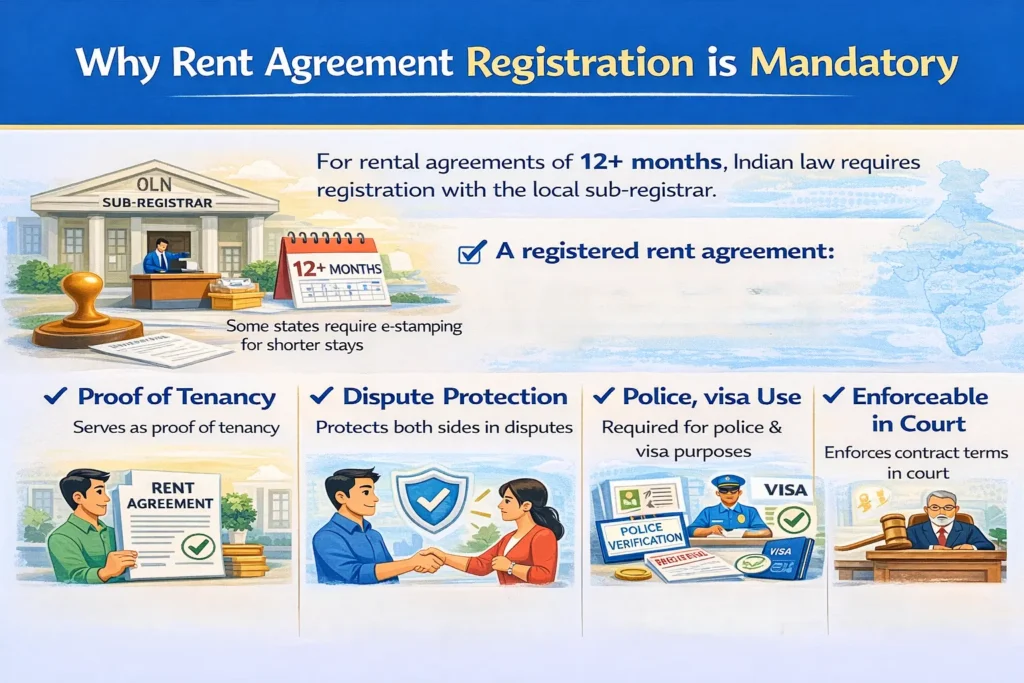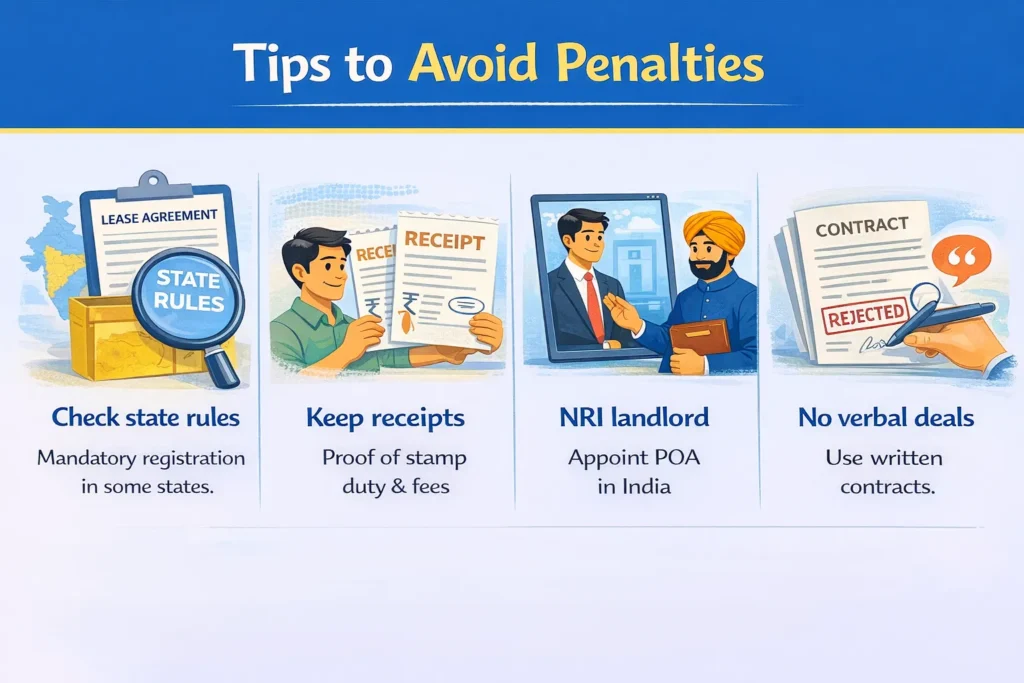
Penalties for Not Registering Rent Agreements
When you move into a rented house, one of the first things your landlord will ask you to sign is a rent agreement. Many people think it’s just a formality, but in reality, it’s much more. A rent agreement is not just a piece of paper that outlines rent and terms. It’s a legal document that protects both the tenant and the landlord in case of disputes.
But here’s the catch: if the agreement is not registered, the law doesn’t recognize it as fully valid. And that can cause problems—big ones. You could face penalties, fines, and even lose your legal rights.
This guide will walk you through why registering a rent agreement is mandatory, what happens if you don’t, the penalties involved, and how to avoid getting into legal trouble.
Why Rent Agreement Registration Is Mandatory

Indian law is very clear on this. Under the Registration Act, 1908, any rental agreement that is for 12 months or more must be registered with the local sub-registrar. Even for shorter durations, some states have made registration or e-stamping mandatory to avoid fraud.
Think of it this way. Imagine you bought a car but never registered it. On the surface, it looks like yours. But in the eyes of the government, it’s not really yours. The same logic applies to rent agreements.
A registered rent agreement:
- Serves as proof of tenancy
- Protects both tenant and landlord in case of disputes
- Is required for things like police verification or visa applications
- Ensures that the contract terms can be enforced in court
Without registration, the agreement is just a piece of paper. It won’t stand strong in a legal battle.
What Happens If You Don’t Register a Rent Agreement?
This is the question that worries most tenants and landlords. The truth is, the consequences can range from financial loss to legal headaches.
Legal Invalidity in Court
An unregistered rent agreement has very little value in a court of law. Suppose a tenant refuses to pay rent, and the landlord wants to take action. If the agreement is not registered, the judge may not even consider it as valid evidence.
Similarly, if a landlord suddenly increases rent or tries to evict a tenant without notice, the tenant won’t be able to use the agreement as a shield in court.
In simple words: no registration = no legal protection.
Penalties and Fines (State-wise overview)
The Registration Act allows penalties for failing to register. Different states impose fines differently. Here are some examples:
- Maharashtra: A penalty of up to ₹30,000 or ten times the registration fee.
- Karnataka: Penalty of ten times the registration fee.
- Delhi: Ten times the registration charges, plus stamp duty penalties.
- Tamil Nadu: Fines range depending on the unpaid stamp duty and can add up to thousands.
These penalties don’t just hurt your wallet. They also complicate future transactions, since the government may refuse to accept an unregistered document for any legal purpose.
Tax and Compliance Issues
For landlords, rental income is taxable. If the rent agreement is not registered, it can create issues during tax filing. The income tax department may view it as an attempt to hide income, leading to notices, fines, and even scrutiny.
For tenants, an unregistered agreement could mean losing out on claiming HRA (House Rent Allowance) benefits. Employers usually ask for a registered agreement before processing HRA claims.
Common Myths About Rent Agreement Registration
There are many myths floating around about this topic. Let’s bust some of them:
- “If the rent is low, I don’t need to register.”Wrong. The law doesn’t care about the rent amount. What matters is the duration and state rules.
- “A notarized agreement is enough.”Not true. A notarized agreement is better than nothing, but it is not legally binding in the same way as a registered one.
- “It’s too complicated and time-consuming.”Not anymore. Many states like Maharashtra and Karnataka now offer online registration of rent agreements. It takes less than an hour.
- “It’s just a formality.”No, it’s a safeguard. A registered rent agreement can save you years of legal trouble.
How to Register a Rent Agreement Easily
The process may sound intimidating, but it’s simpler than people think. Here’s how you can do it:
- Draft the agreement with details like rent, deposit, duration, maintenance, and conditions.
- Pay stamp duty and registration fee. This depends on your state. For example, in Maharashtra, it’s about 0.25% of the total rent plus deposit.
- Visit the sub-registrar’s office with the landlord, tenant, and two witnesses.
- Biometric verification is done.
- Get the registered copy.
In states like Maharashtra, you can do this completely online through the IGR portal. The landlord and tenant only need Aadhaar numbers and biometrics.
Tips to Avoid Penalties

- Always check the local state rules. Some states require registration even for 11-month agreements.
- Keep all receipts of stamp duty and registration fees.
- If you’re an NRI landlord, appoint a Power of Attorney holder in India to handle registration.
- Don’t rely on verbal agreements or plain paper contracts.
It’s like wearing a helmet when you ride a bike. Most of the time, nothing happens. But the one time it does, you’ll be glad you had it.
FAQs on Rent Agreement Registration
Is rent agreement registration mandatory in India?
Yes. For agreements of 12 months or more, it is mandatory under the Registration Act, 1908. Some states require it even for 11 months.
What is the penalty for not registering?
It depends on the state. It can go up to 10 times the registration fee plus unpaid stamp duty.
Can an unregistered rent agreement be used in court?
No. It has very limited legal value and may not be accepted as evidence.
Can I register my rent agreement online?
Yes. States like Maharashtra, Karnataka, and Delhi have online registration portals.
Who pays for rent agreement registration?
It can be shared between tenant and landlord, depending on what’s agreed. Usually, both contribute equally.
Conclusion
Not registering a rent agreement is like driving without a seatbelt. You may get away with it for a while, but when trouble strikes, you’ll wish you had taken that small step.
For landlords, registration ensures your property is legally protected. For tenants, it guarantees your rights and helps with things like HRA claims.
The penalties—whether financial fines or loss of legal protection—are simply not worth the risk. The process today is quick, online, and hassle-free. So if you’re renting or leasing property, make registration your first priority.
At the end of the day, a rent agreement is more than just words on paper. It’s peace of mind. And peace of mind is worth every bit of effort.
Pryank Agrawal is the Founder and CEO of Housewise, a leading property management startup serving customers across 45 countries with operations in 22 Indian cities, including Pune, Bengaluru, Hyderabad, Chennai, Delhi NCR, and Mumbai. An engineering graduate from IIT Roorkee, Pryank brings extensive experience from the software industry. His passion for leveraging technology to solve real estate challenges led him to establish Housewise, simplifying property management for homeowners worldwide. After persistent requests from existing customers to address other challenges faced by Non-Resident Indians, he founded MostlyNRI, a dedicated portal assisting NRIs with taxation and financial asset management in India.
